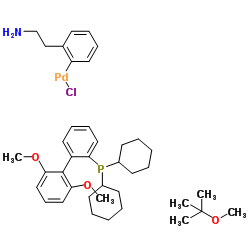1028206-58-7
| 中文名 | 2 -二环己基膦- 2 6二甲氧基- 1 ,1 -联苯 |
|---|---|
| 英文名 | chloropalladium(1+),dicyclohexyl-[2-(2,6-dimethoxyphenyl)phenyl]phosphane,2-methoxy-2-methylpropane,2-phenylethanamine |
| 英文别名 |
chloro(2-dicyclohexylphosphino-2',6'-di-i-propoxy-1,1'-biphenyl)[2-(2-aminoethylphenyl)]palladium(II)
Platinum (II),dichloro(N,N-dimethylethylenediammine) (SP-4-3)-dichlorido(N,Ndimethylethane-1,2-diamine)platinum(II) [Pt2(N,N-dimethylethylenediamine)Cl2] cis-dichloro(N,N-dimethylethylenediamine)platinum(II) cis-(N,N-dimethyl-ethylenediamine)dichloroplatinum(II) [PtCl2(N,N-dimethylethylenediamine)] Dichloro(N,N-dimethylethylenediammine)platinum(II) |
| 分子式 | C39H57ClNO3PPd |
|---|---|
| 分子量 | 760.721 |
| 精确质量 | 759.279968 |
| PSA | 67.30000 |
| LogP | 7.26700 |
| 储存条件 | 室温 |
|
Section 1: Product Identification Chloro(2-dicyclohexylphosphino-2',6'-dimethoxy-1,1'-biphenyl)[2-(2-aminoethylphenyl)]palladium(II) Chemical Name: methyl-t-butylether adduct, min. 98% [SPhos Palladacycle] CAS Registry Number:1028206-58-7 Formula:C34H45ClNO2PPd EINECS Number:none
Chemical Family:organometallic complex Chloro(2-dicyclohexylphosphano-2',6'-dimethoxy-1,1'-biphenyl)[2-(2-aminoethylphenyl)]palladium(II) Synonym: dichloromethane adduct, min. 98% Section 2: Composition and Information on Ingredients IngredientCAS NumberPercentACGIH (TWA)OSHA (PEL) Title compound1028206-58-7100%no datano data Section 3: Hazards Identification Emergency Overview:Irritating to skin, eyes and respiratory tract. Primary Routes of Exposure:Inhalation, skin, eyes Eye Contact:Causes slight to mild irritation of the eyes. Skin Contact:Causes slight to mild irritation of the skin. Inhalation:Irritating to the nose, mucous membranes and respiratory tract. Ingestion:No information available on the physiological effects of ingestion. May be harmful if swallowed. Acute Health Affects:Irritating to skin, eyes and respiratory tract. Chronic Health Affects:No information on long-term chronic effects. NTP:No IARC:No OSHA:No SECTION 4: First Aid Measures Immediately flush the eyes with copious amounts of water for at least 10-15 minutes. A victim may need Eye Exposure: assistance in keeping their eye lids open. Get immediate medical attention. Wash the affected area with water. Remove contaminated clothes if necessary. Seek medical assistance if Skin Exposure: irritation persists. Remove the victim to fresh air. Closely monitor the victim for signs of respiratory problems, such as difficulty Inhalation: in breathing, coughing, wheezing, or pain. In such cases seek immediate medical assistance. Seek medical attention immediately. Keep the victim calm. Give the victim water (only if conscious). Induce Ingestion: vomiting only if directed by medical personnel. SECTION 5: Fire Fighting Measures Flash Point:no data Autoignition Temperature:no data Explosion Limits:no data Extinguishing Medium:carbon dioxide, dry powder or foam If this product is involved in a fire, fire fighters should be equipped with a NIOSH approved positive pressure Special Fire Fighting Procedures: self-contained breathing apparatus and full protective clothing. Hazardous Combustion andIf involved in a fire this material may emit irritating fumes. Decomposion Products: Unusual Fire or Explosion Hazards: No unususal fire or explosion hazards. SECTION 6: Accidental Release Measures Spill and Leak Procedures:Small spills can be mixed with vermiculite or sodium carbonate and swept up. SECTION 7: Handling and Storage Handling and Storage:Store in a tightly sealed container. Keep in a cool, dry, well ventilated place. SECTION 8: Exposure Controls and Personal Protection Eye Protection:Always wear approved safety glasses when handling a chemical substance in the laboratory. Skin Protection:Wear protective clothing and gloves. Ventilation:Handle the material in an efficient fume hood. If ventilation is not available a respirator should be worn. The use of respirators requires a Respirator Respirator: Protection Program to be in compliance with 29 CFR 1910.134. Ventilation:Handle the material in an efficient fume hood. Additional Protection:No additional protection required. SECTION 9: Physical and Chemical Properties Color and Form:white powder Molecular Weight:672.57 Melting Point:no data Boiling Point:no data Vapor Pressure:no data Specific Gravity:no data Odor:none Solubility in Water:insoluble SECTION 10: Stability and Reactivity Stability:air and moisture stable Hazardous Polymerization:no hazardous polymerization Conditions to Avoid:none Incompatibility:oxidizing agents and halogens Decomposition Products:carbon monoxide, palladium chloride, nitrigen oxides, phosphorus oxides and organic fumes. SECTION 11: Toxicological Information RTECS Data:No information available in the RTECS files. Carcinogenic Effects:no data Mutagenic Effects:no data Tetratogenic Effects:no data SECTION 12: Ecological Information Ecological Information:No information available SECTION 13: Disposal Considerations Disposal:Dispose of according to local, state and federal regulations. SECTION 14: Transportation Shipping Name (CFR):Non-hazardous Hazard Class (CFR):NA Additional Hazard Class (CFR):NA Packaging Group (CFR):NA UN ID Number (CFR):NA Shipping Name (IATA):Non-hazardous Hazard Class (IATA):NA Additional Hazard Class (IATA):NA Packaging Group (IATA):NA UN ID Number (IATA):NA SECTION 15: Regulatory Information TSCA:Not listed in the TSCA inventory SARA (Title 313):Title compound not listed Second Ingredient:none SECTION 16 - ADDITIONAL INFORMATION N/A |


